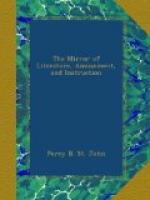It was a natural consequence of this theatrical ardour, that Mr. Stubbs eagerly cultivated the acquaintance of tragedians, comedians, managers, and dramatic writers. It was his supreme delight to have them at his table; and as he kept a good table, gave good wines, and excelled in his cuisine, it was a delight he could command whenever he chose. He had the entre, also, of the green-room at both theatres, and acquired an intimate knowledge of all the feuds, rivalries, managerial oppressions, intrigues, burlesque dignity, and solemn plausibilities, of that mimic world. Living thus in an atmosphere electrical, as it were, with excitement, it is no wonder that, by degrees, he became less and less sensitive with regard to that ambiguous difficulty which had hitherto impeded the gratification nearest his heart.
It happened one morning while Mr. Stubbs was sipping his chocolate and reading, in the Morning Post, a criticism upon a new tragedy which had been most righteously damned the night before, that his intimate friend Mr. Peaess, the manager of —— theatre dropped in. After the usual salutations were exchanged, and Mr. Peaess had remarked that it was a fine morning, and Mr. Stubbs had added that it was a windy one, Mr. Stubbs fell into a brown study. His mind laboured with a gigantic purpose. It was a moment on which hung indescribable consequences.—Shall I? Will he? Yes!—yes!—And he did! He imparted to his friend, the manager, his resolution to make his FIRST APPEARANCE. He fixed upon Hamlet, chiefly because the character was so admirably diversified by Shakspeare, that it presented opportunities for the display of an equal diversity of talent in its representative.




